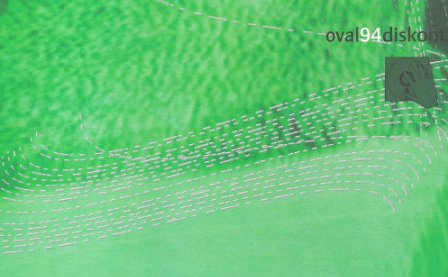The trend with many of the last quarter century’s second-wave IDM pioneers has been a shift away from abstraction and toward something that could more easily pass as “real” music, but the Oval brand, which has been Markus Popp’s solo project since the trio’s two other members left the group in 1995, has always been synonymous with abstraction. Popp pretty much “invented” the “glitch” subgenre, a style known for reminding listeners of the sounds of skipping CDs and malfunctioning lo-fi samplers. Since the sound found its basis in the manipulation of then-current technology, it couldn’t help but sound shocking and original, even unprecedented, especially in the hands of a true innovator like Popp. The music descended on its audience like a full-grown beast that had been nurtured within a foreign consciousness. Its reliance on idiosyncratic processes made it inscrutable to the uninitiated; in fact, such mystery is one of the main reason that early albums like 1994’s Systemisch are interesting and listenable at all. The music wasn’t particularly dynamic, dramatic, or imbued with meaningful detail; it was notable for its fundamental foreignness, a strangeness that persisted through repeated listens.
Popp knows technology well enough to evade a certain scrutiny. His sound has evolved a lot since Systemische, expanding not only in its intricacy and detail, but also in its inclusion of more organic sounds, most notably on 2003’s So. The album, a collaboration with vocalist Eriko Toyada, featured intimate, spectral vocals fading in and out amidst Popp’s rhythmless, severely distorted soundscapes to create a unique and eerie connection between the human and the artificial. Popp extends this connection with Oh, an EP that breaks his nearly decade-long silence, but instead of the unguarded intimacy offered by the human voice, the organic element in Oh shows up as drums and guitars — although, true to form, they appear in nearly unrecognizable permutations.
Essentially, it’s an Oval EP with drum grooves on it. That should be enough to get you to listen to it. There aren’t that many drum grooves, and their structural restlessness brings new meaning to the word “glitch.” But the percussive feel of Oh introduces a new concern with the tactile side of things. Even more pervasive than the rhythmic liveliness on the EP’s longer, earlier tracks is, for lack of a more elegant description, a “plucking” sensation. Most of the tunes last between 60 and 90 seconds, consisting of brief improvisatory meditations on a certain groups of notes, clinging loosely to motifs that can loosely be called “rhythmic.” They trade the relentless barrages of cascading digital detail of earlier albums for scattered stabs of digital plucking. And I even have to use the term “plucking” loosely, because it’s impossible to tell whether these sounds’ protruding angles have been sharpened by human hands or computer software.
Regardless, Markus has done it again: I can’t picture any human being sitting in a room with a guitar and playing rhythms like this, but there’s also no denying the organic, handmade genesis of most (if not all) of the sounds included here. You could call this “pop” if you want, but I don’t anticipate any of those annoying high school kids on the train downloading these little ditties as cellphone ringtones. In spite of the nearly minimalistic reserve of some of these quiet tracks and the increased inclusion of apparently direct sensual detail, accounting for the existence of Oh remains nearly impossible.
More about: Oval




